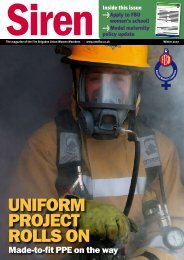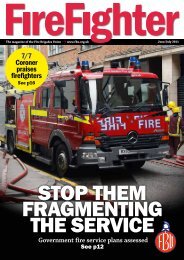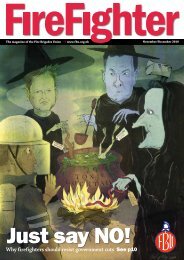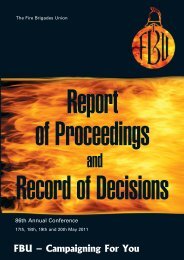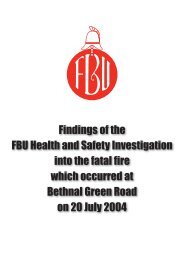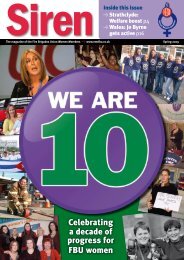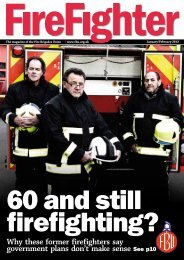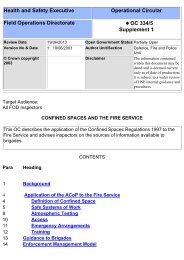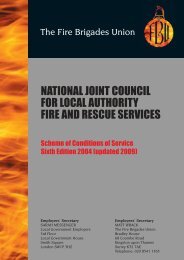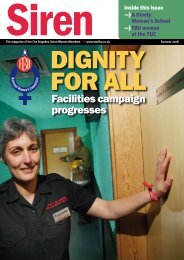Report - Fire Brigades Union
Report - Fire Brigades Union
Report - Fire Brigades Union
Create successful ePaper yourself
Turn your PDF publications into a flip-book with our unique Google optimized e-Paper software.
SECTION A — NATIONAL JOINT COUNCIL<br />
63. An employee is entitled to take a reasonable amount of<br />
unpaid time off during his or her working hours in order to<br />
take action that is necessary to care for a dependant.<br />
Examples of such circumstances are:<br />
(1) To provide assistance on an occasion when a<br />
dependant falls ill, gives birth (this does not include<br />
taking time off after the birth to care for the child) or is<br />
injured or assaulted.<br />
(2) To make arrangements for the provision of care for a<br />
dependant who is ill or injured.<br />
(3) In consequence of the death of a dependant.<br />
(4) To deal with an incident that involves an employee’s<br />
child and which occurs unexpectedly in a period during<br />
which an educational establishment that the child<br />
attends is responsible for him or her.<br />
(5) To deal with unexpected termination or disruption of<br />
care arrangements.<br />
64. Where time off is taken in any of the above circumstances<br />
the employee is required to inform the fire and rescue<br />
authority as soon as is reasonably practicable of the reason<br />
for, and anticipated length of, his or her absence. There<br />
may be exceptional circumstances where an employee<br />
returns to work before it is possible to contact the<br />
authority. In such cases, the authority should still be<br />
advised of the reason for absence on return.<br />
A13 Part-time workers (RDS)<br />
– terms and conditions<br />
settlement<br />
During 2010 work continued on finalising the details of the<br />
changes to the Grey Book arising from the successful legal<br />
challenge on behalf of members working the retained duty<br />
system to ensure parity in line with the part-time workers<br />
regulations and the compensation arrangements. The NJC<br />
issued two circulars on this matter, 02/2010 and 05/2010, on<br />
13 April and 17 June respectively.<br />
The terms of the settlement were subject to revision during<br />
the year, some advantageous, some not so advantageous.<br />
Circular NJC/2/10 13 April 2010<br />
Dear Sir/Madam<br />
PART-TIME WORKERS (PREVENTION OF LESS<br />
FAVOURABLE TREATMENT) REGULATIONS – FIRE<br />
BRIGADES UNION EMPLOYMENT TRIBUNAL CASES<br />
Settlement Negotiations<br />
1. You will be aware that test cases in two authorities, Kent<br />
and Berkshire, were identified in 2001 under the above<br />
legislation. Those test cases have been subject to the<br />
Employment Tribunal, Employment Appeal Tribunal, Court<br />
of Appeal and House of Lords processes returning finally at<br />
the request of the House of Lords to the original<br />
Employment Tribunal again for re-consideration and<br />
determination.<br />
2. The judgement of the Tribunal on that occasion was:<br />
(i) The Tribunal finds and declares that the Claimants were<br />
engaged in broadly similar work as their named<br />
comparators.<br />
(ii) The Claimants were treated less favourably than their<br />
named comparators in respect of access to pension<br />
rights and payment for sickness absence.<br />
(iii) The Respondent’s arguments of justification are<br />
dismissed.<br />
(iv) The Claimant’s claim for increased pay for additional<br />
responsibilities is adjourned for 8 weeks.”<br />
3. The Tribunal indicated that it believed the parties should<br />
endeavour to reach a negotiated settlement. Following<br />
discussion within the respective Sides an approach was<br />
made to Tribunal to allow the parties time for those<br />
negotiations to take place. Tribunal’s current expectation is<br />
that the matter will be resolved by 1 May.<br />
4. Following what has been an extremely complex<br />
negotiation we write to advise you that a settlement in<br />
respect of the terms and conditions aspect of the case has<br />
now been agreed in principle with the FBU. Key points of<br />
the ‘in principle’ settlement are outlined below:<br />
a. the compensation covers retained duty system<br />
employees employed for any part of the reference<br />
period, 1 July 2000 to 30 June 2009<br />
b. the compensation payment is pro-rata to length of<br />
service, rank/role and level of cover based on a<br />
particular date - which for those holding employment<br />
status currently will be 30 June 2009. Cover pro-rata<br />
adjustment to be not less than 75% (which reflects the<br />
pay structure)<br />
c. maximum levels of payment – firefighter £675; leading<br />
firefighter/crew manager £700; watch manager/sub<br />
and station officers £725. Minimum payment of £150<br />
d. in full settlement of the wide range of issues raised<br />
through this legislation:<br />
● Sick leave<br />
● Acting-up allowance<br />
● Pay for public holidays<br />
● End of course leave<br />
● Trade union leave<br />
● Overtime<br />
● Spoiled meals allowance<br />
● Removals/lodging allowance<br />
● Recall to duty<br />
● Payment during suspension<br />
● Payment during maternity support leave<br />
● Special leave<br />
● All other claims or potential claims under the Part-<br />
Time Workers (Prevention of Less Favourable<br />
Treatment) Regulations arising from the 6th edition<br />
of the Scheme of Conditions of Service of the<br />
National Joint Council for Local Authority <strong>Fire</strong> and<br />
Rescue Services (and its predecessors) up to 30<br />
June 2009.<br />
26 FBU Annual <strong>Report</strong> 2011





